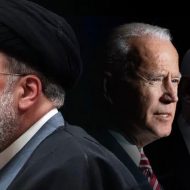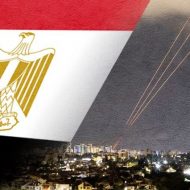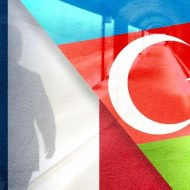On February 14, Jaish-e-Mohammed (a Pakistan-based Deobandi jihadist terrorist group) carried out an act of terrorism in the Indian part of Kashmir. A suicide bomber rammed a car loaded with more than 300 kilograms of explosives into a bus carrying Indian police officers. As a result, at least 44 people died. After the terrorist attack, India accused Pakistan of supporting terrorist groups operating in its territory such as the one that launched the attack. Islamabad denies these allegations.
On February 26, the Ministry of Foreign Affairs of India announced the bombing of a camp belonging to the Islamist organization Jaish-e-Muhammad in Pakistan. According to a Reuters source in the Indian government, about 300 militants were killed. The blow was struck near the town of Balakot, 50 kilometers from the border. As noted by Reuters, India has not penetrated this far into Pakistan’s territory since 1971.
India said it shot down a Pakistani fighter and also lost its own in Kashmir. According to the Indian Ministry of Foreign Affairs, Pakistani planes violated India’s airspace on the morning of February 27. In response, the Indian air force was deployed to the sky. During the air battle, one Pakistani Air Force fighter was shot down and the Indian MiG-21 fighter was lost. The pilot was verified as captured by Pakistanis. India did not say anything about the fate of the downed Pakistani aircraft pilot.
Pakistan claims that two Indian aircraft were destroyed.
India It was simply a defence activity.Waiting for surprise still pending #PakistanStrikesBack pic.twitter.com/0af5tZ5Ota
— Shoaib Ahmad 🇹Zalmi (@shoaibahmadsh) February 27, 2019
According to the official representative of the Pakistani armed forces, Asif Ghafoor, the border was not breached by Pakistani, but by Indian aircraft. One of the downed fighters fell in the Indian part of Kashmir, the other – in Pakistan. According to Ghafoor, two pilots of the second plane were captured. Whether the pilots of the first plane survived is unknown. Earlier, Indian police said that two pilots and one local resident were killed in the crash of an Indian Air Force plane in Kashmir. Whether this was a plane shot down by Pakistan was not specified.
The Pakistani Foreign Ministry said that Islamabad has demonstrated the ability of self-defense, but at the same time, it does not seek war with New Delhi.
Besharam log tumhare bap k trees the jo bhool jaen ge
we do surgical strikes with proofs 😘#PakArmyZindabad 🇵🇰#budgam #kararajawab pic.twitter.com/GYNurCSU9n— Aadii🇵🇰 (@aadii_who) February 27, 2019
A number of countries are concerned about the situation and even canceled flights passing through Kashmir.
VICTIMS, COUNTRY REACTIONS
The outbreak of the crisis between Pakistan and India is now an echo of a larger historical conflict: mutual claims on both countries to each other and a dispute over the right to own territories in Kashmir. The division of this disputed territory is not enshrined in law by any international pact.
The uncertain status of the Kashmir region became the pretext for military clashes over the past twenty years. Both sides (Pakistan and India) have not wanted to make any concessions to the other on the issue of the disputed territory, following their own political ambitions.
In addition to the territorial dispute, there is the issue of security. New Delhi sees Pakistan as a major threat in the first place and accuses them of complicity with terrorism. It is in the disputed territory that Pakistani separatists are active, who are in favor of independence or the annexation of Kashmir to Pakistan, and constantly carry out attacks against the Indian population.
Perhaps the local nature of this confrontation between Pakistan and India would not be so dangerous and alarming if it were not for the fact that both countries are nuclear powers. Therefore, the escalation of confrontation into the military phase can jeopardize the security of not only the neighboring countries of the region but the entire world.
Thus, the last armed conflict between India and Pakistan (the Kargil war) in 1999 could grow not just into a full-scale regional conflict but become a global catastrophe. Former Pakistani Prime Minister, Pervez Musharraf, said that if Islamabad was defeated, it would use its nuclear potential for military purposes. Fortunately, international parties managed to calm the tension.
On the other hand, between New Delhi and Islamabad, there is not only a military confrontation but also a great economic competition, in which neighboring countries are drawn.
According to India, Pakistan, as a neighbor of Afghanistan, is the “axis of evil” and in the hotbed of terrorist activity represented by the Islamist movement Tehrik-e Taliban, located in the so-called “Tribal Zone”. Militants belonging to this group are undermining the security of Afghanistan, and the authorities in Islamabad are silent, not making effective efforts to eliminate the “nest of terror” on their doorstep. That is why the authorities in Kabul blame Pakistan for backing many terrorist acts and direct interference in the internal affairs of the country. Pakistan, on the other hand, is a trade partner of Afghanistan despite the difficult situation with India.
New Delhi is an investor in the Afghan economy, as well as a friendly neighbor who provides medical assistance to Afghan citizens and refugees, and provides support for the development of the transportation infrastructure of Afghanistan. Today, India is the largest regional donor of aid to Afghanistan and the fifth largest country in the world in terms of assistance to the country. The amount of assistance is over 3 billion dollars a year. Therefore, the stability, security and economic development of this country are important for Afghanistan.
Another neighbor of the conflicting parties (Pakistan and India) is Iran, which is also dissatisfied with what is happening, and how Afghanistan has partially appeared between the hammer and the anvil. Tehran, as well as Kabul and New Delhi, have disputes with Islamabad on security issues. In the border zone, which is a very large region, terrorist groups are operating, such as Jundullah and Jaish al-Adl, whose militants constantly carry out attacks in Iranian territory. Tehran is suffering heavy human losses in order to maintain security at the border. And in this regard, they have big complaints against the Pakistani authorities: Tehran accuses them of neglecting, if not supporting, terrorists.
On the other hand, Iran pursues economic interests in large and far-reaching projects on a regional scale. For example, discussions on the construction of an Indian-Iranian gas pipeline from the Iranian port “Chabahar”, which will increase the volume of trade between India, Iran, and Afghanistan, bypassing Pakistan. This port plays a significant role in the operation of another large-scale project – the North-South International Transport Corridor, in which the economic interests of Russia, Iran and India are involved.
There is a project that China is promoting with the close partnership of Pakistan “One Belt – One Way”. Iran acts as a link in the promotion of this transport corridor.
Thus, the transition of the Indo-Pakistani conflict into this newly escalated “hot” phase will heavily complicate the multilateral and bilateral economic projects in which Iran participates. Apparently, Iran will prefer to maintain neutrality here, since it will take into account its economic interests, despite the fact that Pakistan expects support in the same way as in the Kargil conflict from its Islamic neighbor. Most likely Iran will be ready to act as a mediator to reduce the escalation of the conflict and reconcile the two warring parties.









Leave a Reply